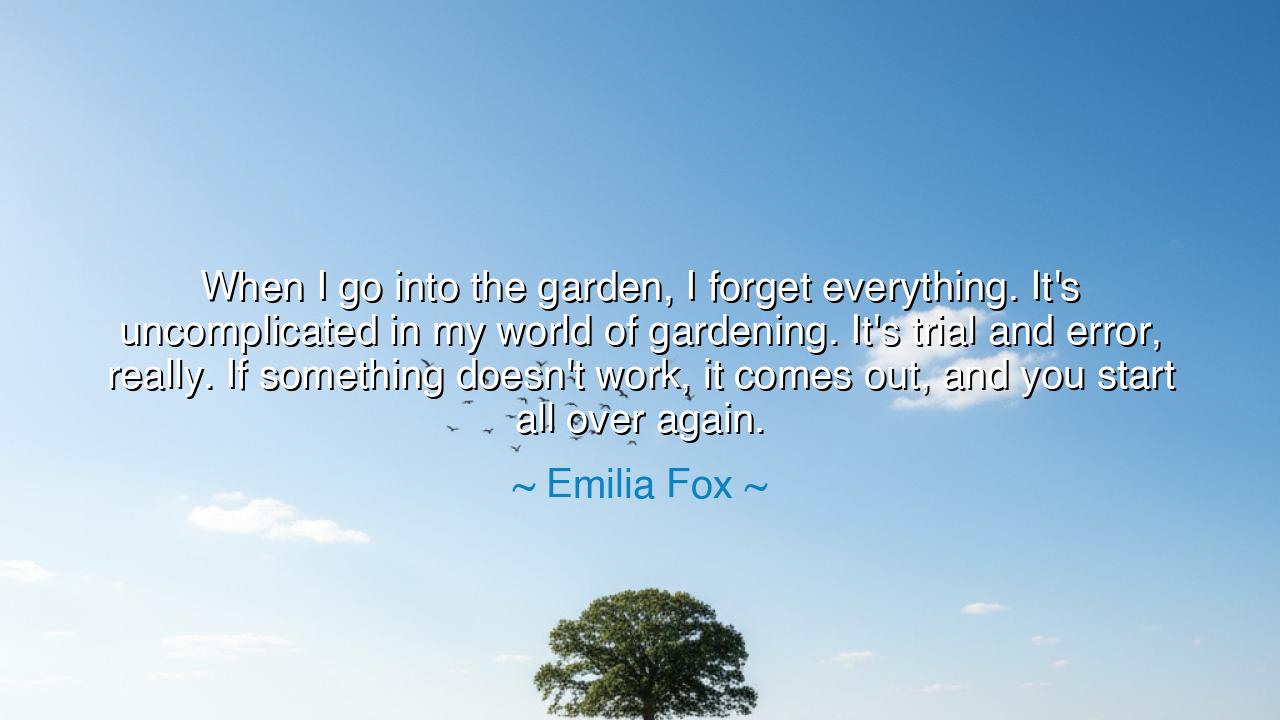
When I go into the garden, I forget everything. It's
When I go into the garden, I forget everything. It's uncomplicated in my world of gardening. It's trial and error, really. If something doesn't work, it comes out, and you start all over again.






In the quiet embrace of the garden, there exists a timeless wisdom, one that transcends the clamor of daily life and invites the soul to rest and reflect. Emilia Fox, in her simple yet profound words, captures this essence: "When I go into the garden, I forget everything. It's uncomplicated in my world of gardening. It's trial and error, really. If something doesn't work, it comes out, and you start all over again." These words echo the ancient teachings that the act of tending to the earth is not only a physical labor but a spiritual practice, one that requires patience, humility, and a deep connection to the cycles of life. In the garden, the gardener finds peace, not because everything is perfect, but because the garden offers a space to learn, to fail, and to begin anew.
The ancients understood well the profound connection between the human soul and the earth. The great Greek philosophers like Socrates and Aristotle often spoke of the importance of cultivating the mind and spirit, but they also recognized the value of cultivating the land. For the ancient Greeks, a garden was a space of reflection, a place where one could experience the natural rhythms of life and death, of growth and decay. They knew that the garden was not just a place of beauty, but a place where the gardener could surrender to nature’s wisdom, learning the art of patience and perseverance. Emilia Fox’s words mirror this ancient truth—gardening is not about perfection but about acceptance and adaptation. When something does not work, we are invited to learn from the mistake and begin anew, just as the garden renews itself with each season.
In the ancient Roman world, gardening was seen not only as a task but as a form of meditation and spiritual renewal. The Roman poet Virgil wrote extensively about the pleasures and wisdom found in the gardens. In his work Georgics, Virgil celebrated the life of the farmer and gardener, praising the labor that connects human beings to the earth. He spoke of the garden as a place where the worker must observe, learn, and adapt to nature’s ways, understanding that some crops would fail and others would thrive, and this was all part of the natural cycle. The gardener, in this sense, was not a conqueror of nature, but a humble student, willing to learn through both success and failure. Emilia Fox echoes this sentiment, noting that gardening is, in its essence, an ongoing lesson in growth and renewal.
Trial and error, as Fox describes it, is a core principle not just of gardening, but of life itself. The ancient Chinese philosopher Laozi, in his timeless work Tao Te Ching, spoke of the importance of accepting failure and learning from it. Laozi taught that true wisdom comes not from avoiding mistakes, but from understanding that mistakes are an essential part of the journey. The gardener who plants a seed and watches it fail learns as much from that failure as from the seeds that grow strong. In life, as in the garden, we must be willing to try, to fail, and to try again, for it is through failure that we find the seeds of wisdom. The garden, with its cycles of growth and decay, teaches us to embrace imperfection, to trust that every effort contributes to the broader tapestry of existence.
Consider the story of the ancient Japanese Zen masters, who created the revered Zen gardens. These gardens, known for their simplicity and beauty, were not designed to be perfect. The very nature of the Zen garden was to reflect the impermanence of life—the raked sand, the carefully placed stones, and the sparse vegetation all symbolized the fleeting nature of existence. The Zen master, much like the gardener, would continually engage in the act of creation and re-creation, understanding that the garden, like life, was never meant to be static or perfect. Each gesture in the garden, each rake of the gravel, was a meditation, a way of understanding the ebb and flow of life. In this way, gardening became a profound spiritual practice, one that invited failure and success as part of the process of enlightenment.
Emilia Fox’s observation about gardening speaks to a deeper truth—that the garden is a metaphor for life itself. It is a place where we learn to let go of control, to accept that not everything will grow as we expect, and to appreciate the beauty in both the successes and failures. Gardening teaches us that growth is a process—one that involves patience, adaptability, and the willingness to start over when necessary. Just as a plant must be nurtured with time, so too must our own hearts and minds be cared for with love and patience, learning from each experience, whether it ends in success or failure.
The lesson here is one of humility and acceptance. Just as the gardener accepts that some plants will thrive while others will fail, so too must we accept that life is filled with both challenges and triumphs. Let us take inspiration from Emilia Fox’s words and approach our lives—our work, our relationships, and our dreams—with the understanding that not every effort will be perfect. We must embrace the trial and error, recognizing that it is in the process of starting over that we find our true strength. In the garden, as in life, each moment of failure is a chance to learn, to grow, and to begin again with greater wisdom. Let us then walk the path of the gardener—humble, patient, and ever willing to start anew.






AAdministratorAdministrator
Welcome, honored guests. Please leave a comment, we will respond soon